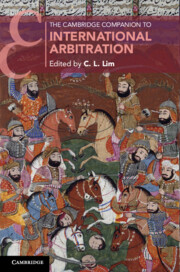Book contents
- The Cambridge Companion to International Arbitration
- Cambridge Companions to Law
- The Cambridge Companion to International Arbitration
- Copyright page
- Dedication
- Contents
- Contributors
- Foreword
- Preface
- Treaties, National Legislation, Cases and Awards
- Part I The History, Doctrines and Sociology of the Growth of Transnational Justice
- 1 Development of the Principal Forms from Antiquity to Arbitromania
- 2 Dealing in Virtue
- Part II International Commercial Arbitration as a Transnational Justice System
- Part III Investor-State Arbitration
- Part IV Inter-State Arbitration and the Pursuit of Peace
- Part V Systemic, Trans-Substantive and New Issues
- Index
2 - Dealing in Virtue
A Perspective from Almost 25 Years Later
from Part I - The History, Doctrines and Sociology of the Growth of Transnational Justice
Published online by Cambridge University Press: 08 October 2021
- The Cambridge Companion to International Arbitration
- Cambridge Companions to Law
- The Cambridge Companion to International Arbitration
- Copyright page
- Dedication
- Contents
- Contributors
- Foreword
- Preface
- Treaties, National Legislation, Cases and Awards
- Part I The History, Doctrines and Sociology of the Growth of Transnational Justice
- 1 Development of the Principal Forms from Antiquity to Arbitromania
- 2 Dealing in Virtue
- Part II International Commercial Arbitration as a Transnational Justice System
- Part III Investor-State Arbitration
- Part IV Inter-State Arbitration and the Pursuit of Peace
- Part V Systemic, Trans-Substantive and New Issues
- Index
Summary
Dealing in Virtue, which Yves Dezalay and I published in 1996,1 was an effort to understand the origins of international commercial arbitration, its rise to become the default dispute resolution process for transnational disputes, how the arbitrators gained their positions and earned the legitimacy to be selected in high-stakes disputes, and how the rise of international commercial arbitration affected dispute resolution within national States. We interviewed some 400 members of the international commercial arbitration community. One of the most noted findings was that there was a tension between what we termed the “grand old men” of international commercial arbitration and a group of arbitration technocrats who both challenged them and preserved and defended their world. The grand old men were senior arbitrators who had made their careers in academia or practice or in the judiciary, arbitrated part-time (at least until the boom in arbitration in the 1980s), and in Weberian terms told to us in an interview of a technocrat, relied on their charisma for legitimacy.
- Type
- Chapter
- Information
- The Cambridge Companion to International Arbitration , pp. 38 - 58Publisher: Cambridge University PressPrint publication year: 2021

